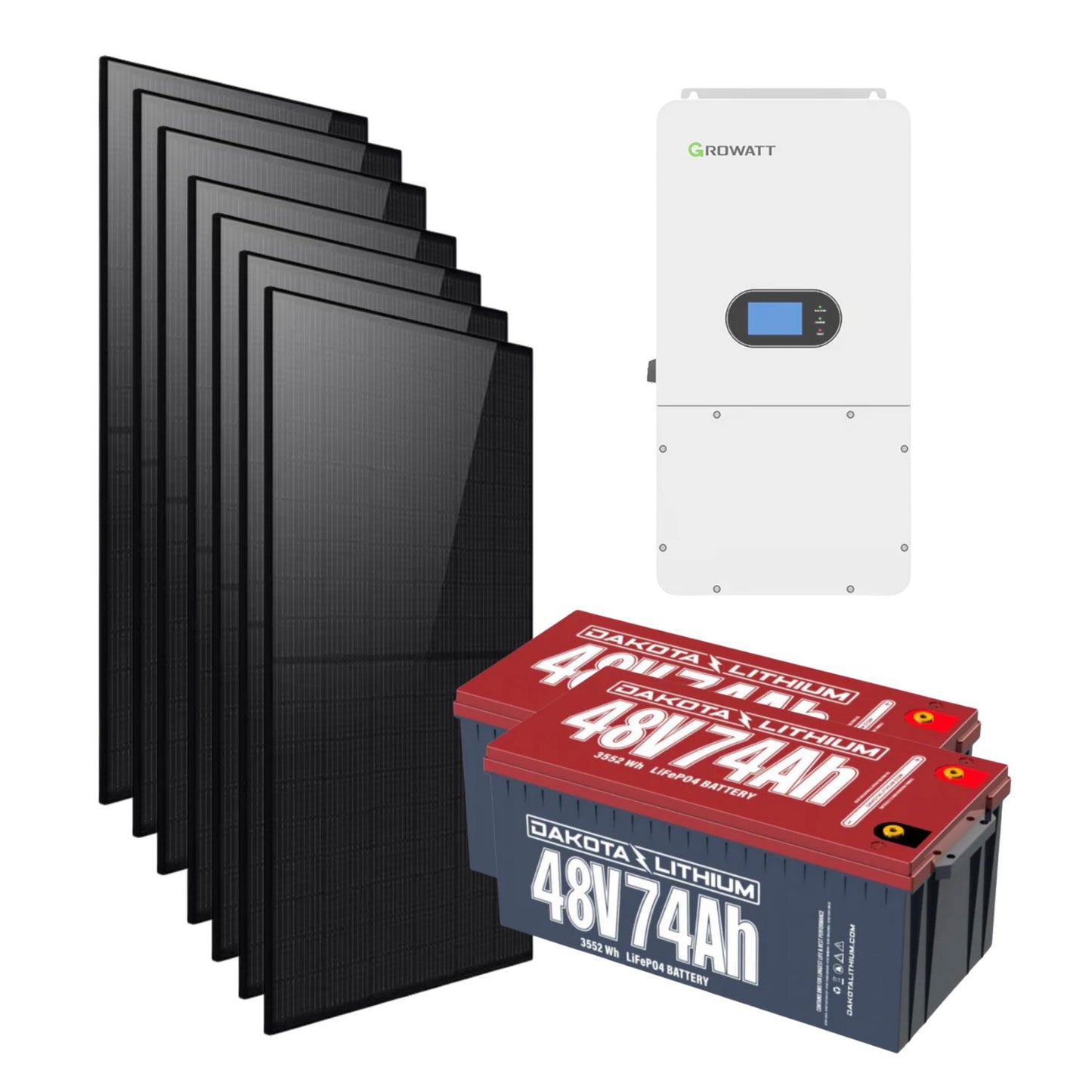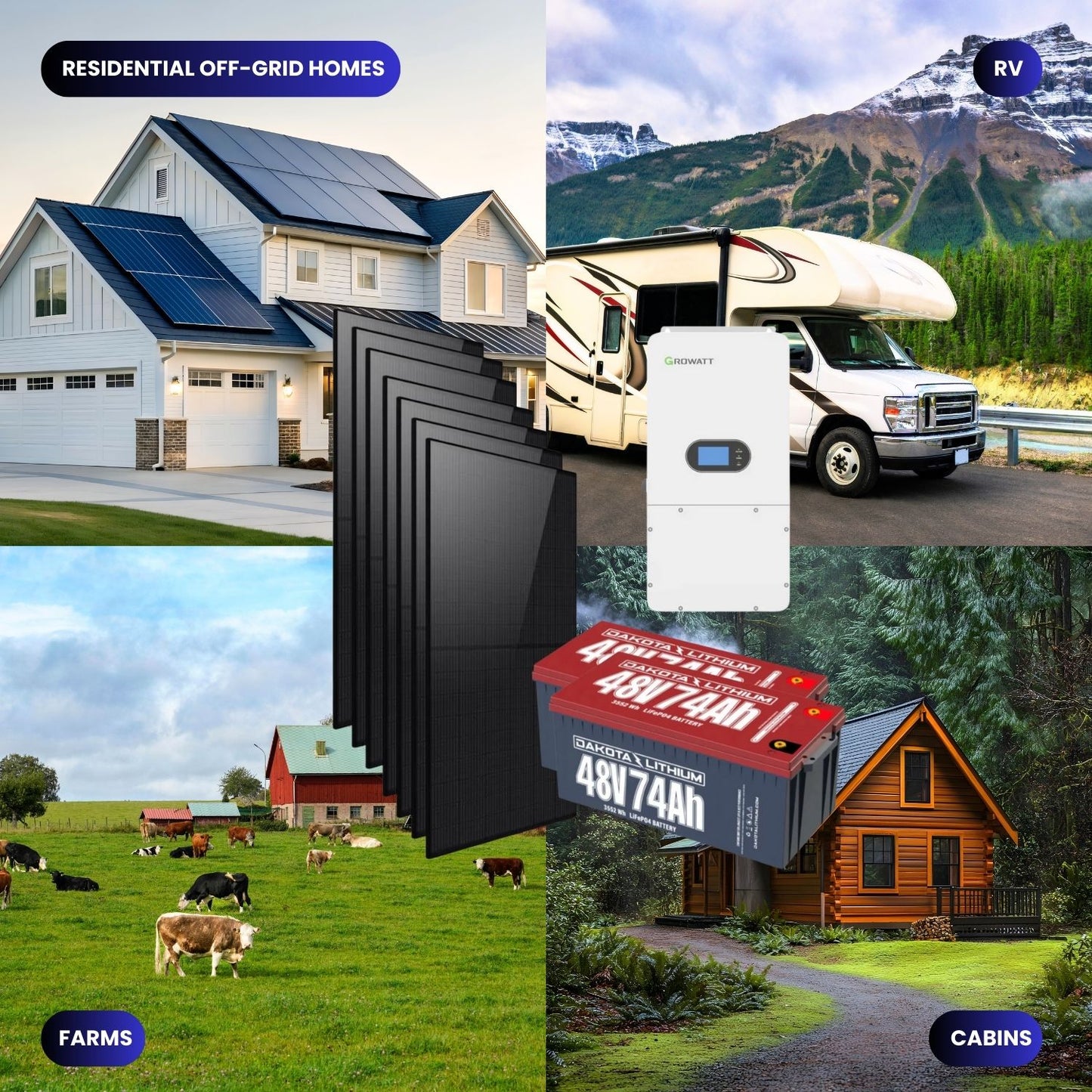Rocksolar 10kW Off-Grid Solar Kit with Hybrid Inverter, 48V Lithium Storage & 12×600W Panels
Rocksolar 10kW Off-Grid Solar Kit with Hybrid Inverter, 48V Lithium Storage & 12×600W Panels
Bulk Order Inquiry
Bulk Order Inquiry
Interested in ordering in bulk? We offer competitive pricing and flexible terms for large orders.
Couldn't load pickup availability
10 kW Off-Grid Solar System — SPH10000TL Inverter + 2×48V 74Ah Batteries + 12×600W Panels
A high-capacity off-grid solution designed for whole-home backup, larger cabins, small farms, and remote commercial loads. This turnkey configuration pairs a 10 kW SPH10000TL inverter with dual 48V 74Ah lithium batteries and a 7.2 kW (12×600W) solar array to deliver robust daytime production and reliable energy storage.
Core Components
-
Inverter: SPH10000TL — 10 kW continuous output (pure sine wave; verify surge capability for motor starts).
-
Batteries: 2 × 48V 74Ah (each = 48V × 74Ah = 3552 Wh); combined nominal = 7104 Wh).
-
Solar Array: 12 × 600W panels = 7200 W (7.2 kW) nominal DC.
-
Recommended Charge Controller(s): MPPT(s) sized to handle ~150 A at 48V (see sizing notes).
Key Performance Estimates (Example Assumptions)
|
Parameter |
Value / Calculation |
|---|---|
|
Solar array peak power |
7,200 W (12 × 600 W) |
|
Battery nominal energy (combined) |
7,104 Wh (2 × 3,552 Wh) |
|
Usable battery (assume 80% DoD) |
5,683.2 Wh (7,104 × 0.80) |
|
Estimated daily solar energy (example: 4 peak sun hours) |
28,800 Wh / 28.8 kWh (7,200 W × 4 h) |
|
Estimated max charge current into 48V battery |
≈150 A (7,200 W ÷ 48 V = 150 A) — allow margin and choose MPPT ≥ 160–200 A or split arrays across multiple MPPTs. |
Runtime Examples (Using Usable Battery Only)
-
3,000 W continuous load → 5,683.2 Wh ÷ 3,000 W ≈ ~1.89 hours
-
1,000 W continuous load → 5,683.2 Wh ÷ 1,000 W ≈ ~5.68 hours
-
500 W continuous load → 5,683.2 Wh ÷ 500 W ≈ ~11.37 hours
Typical Applications
-
Full off-grid or backup power for larger cabins and rural homes
-
Small farms and agricultural pumps (with appropriate motor start handling)
-
Workshops, telecom sites, and remote commercial loads requiring multi-kW capacity
-
Extended RV or caravan systems when paired with smart charge management
Recommended Supporting Components & Configuration Notes
-
MPPT Charge Controller(s): Because the array can produce ~150 A at 48 V, use either a single high-current MPPT (≥160–200 A) or split the array between two or more MPPT inputs to meet voltage/current limits and improve reliability.
-
Battery Management System (BMS): Required for cell balancing, safety, and long battery life. Ensure the inverter and BMS communicate properly.
-
Surge Capacity: Verify inverter’s surge rating for motor starts (pumps, compressors). Add soft-start devices if needed for heavy inductive loads.
-
Protection & Controls: DC fuses, breakers, disconnects, and proper grounding per local code (NEC/CEC or local authority).
-
Cabling: Use appropriately gauged battery and PV cabling to limit voltage drop; consider a PV combiner for array organization.
-
Array Layout: Design string length (series/parallel arrangement) to keep Voc and Vmp within MPPT/inverter limits across temperature ranges.
Installation & Best Practices
-
Perform a site survey for shading, tilt, and optimal azimuth to maximize production.
-
Plan for expansion: extra inverter capacity, additional batteries, or more panels if future loads increase.
-
Mount panels with corrosion-resistant hardware and proper tilt for your latitude.
-
Commission the system with BMS/inverter/MPPT firmware configured for 48V battery chemistry and safety limits.
-
Follow local electrical code and obtain required permits and inspections.
Maintenance & Warranty Guidance
-
Inspect panels, mounts, and wiring annually; clean panels when needed.
-
Monitor battery health using BMS logs and maintain recommended temperature/storage conditions.
-
Keep inverter and MPPT firmware current where supported.
-
Confirm manufacturer warranties for panels, inverter, and batteries (typical ranges: panels 10–25 years, inverters 5–10 years, batteries vary by chemistry and supplier).
Why Choose This Configuration?
This 10 kW system strikes a strong balance between high instantaneous power (10 kW inverter), durable battery backup (≈7.1 kWh nominal), and substantial solar input (7.2 kW), making it an excellent choice for users who require reliable multi-kilowatt performance off grid. With proper sizing of MPPT and careful installation, the kit supports whole-home loads, farm equipment, and longer autonomy with modest battery expansion.Need a site-specific design or a quote? Contact our technical team to tailor battery capacity, inverter configuration, and panel layout to your exact load profile and location.







BEST SELLERS
-
Sail Away Solar Kit III
Regular price $4,159.99 CADRegular priceUnit price per$4,999.99 CADSale price $4,159.99 CADSale -
Sail Away Solar Kit II
Regular price $3,099.99 CADRegular priceUnit price per$3,699.99 CADSale price $3,099.99 CADSale -
Sail Away Solar Kit I
Regular price $1,669.99 CADRegular priceUnit price per$1,769.99 CADSale price $1,669.99 CADSale










